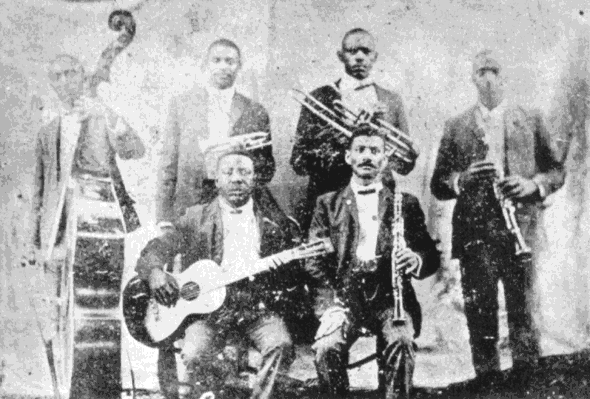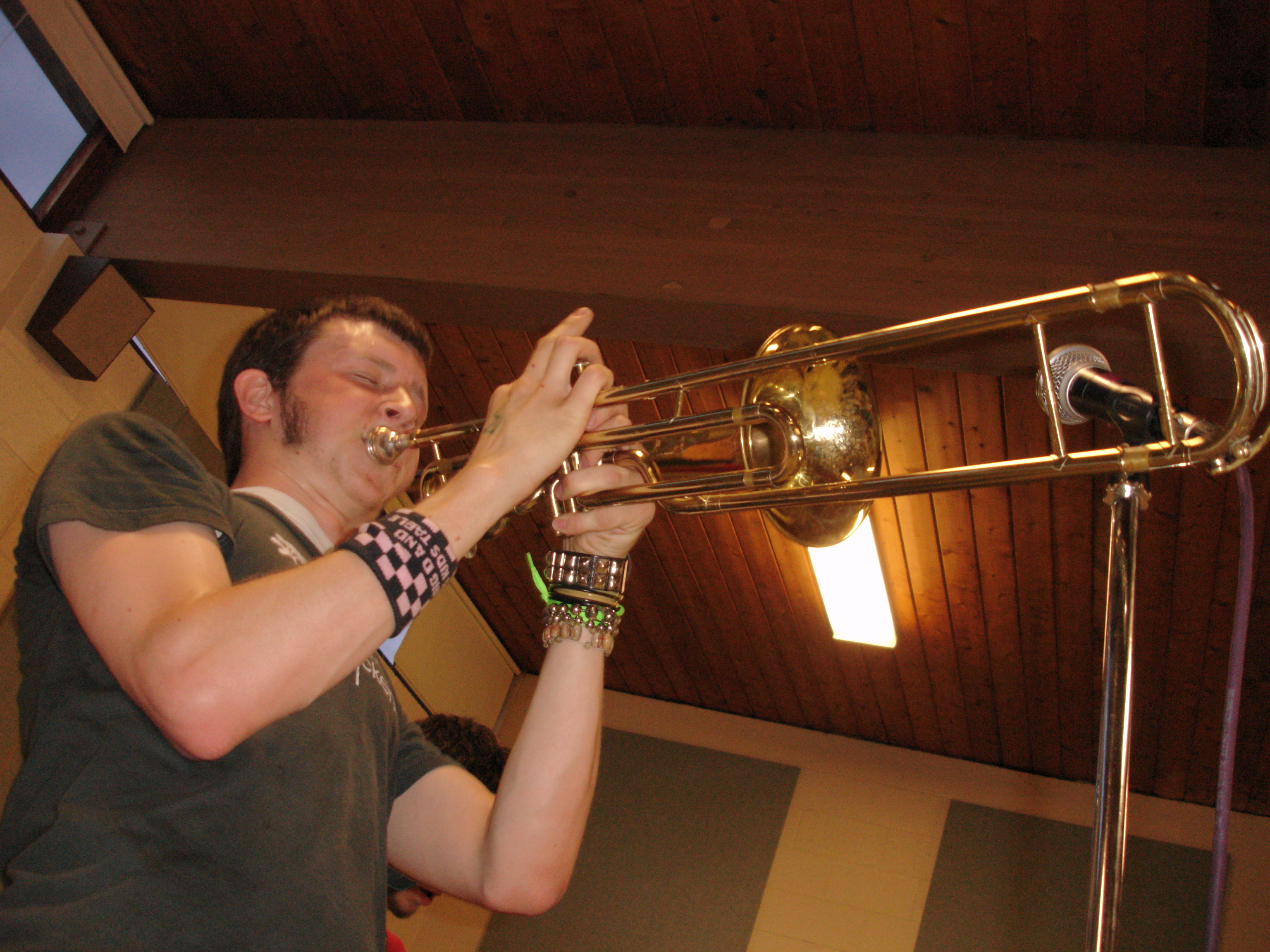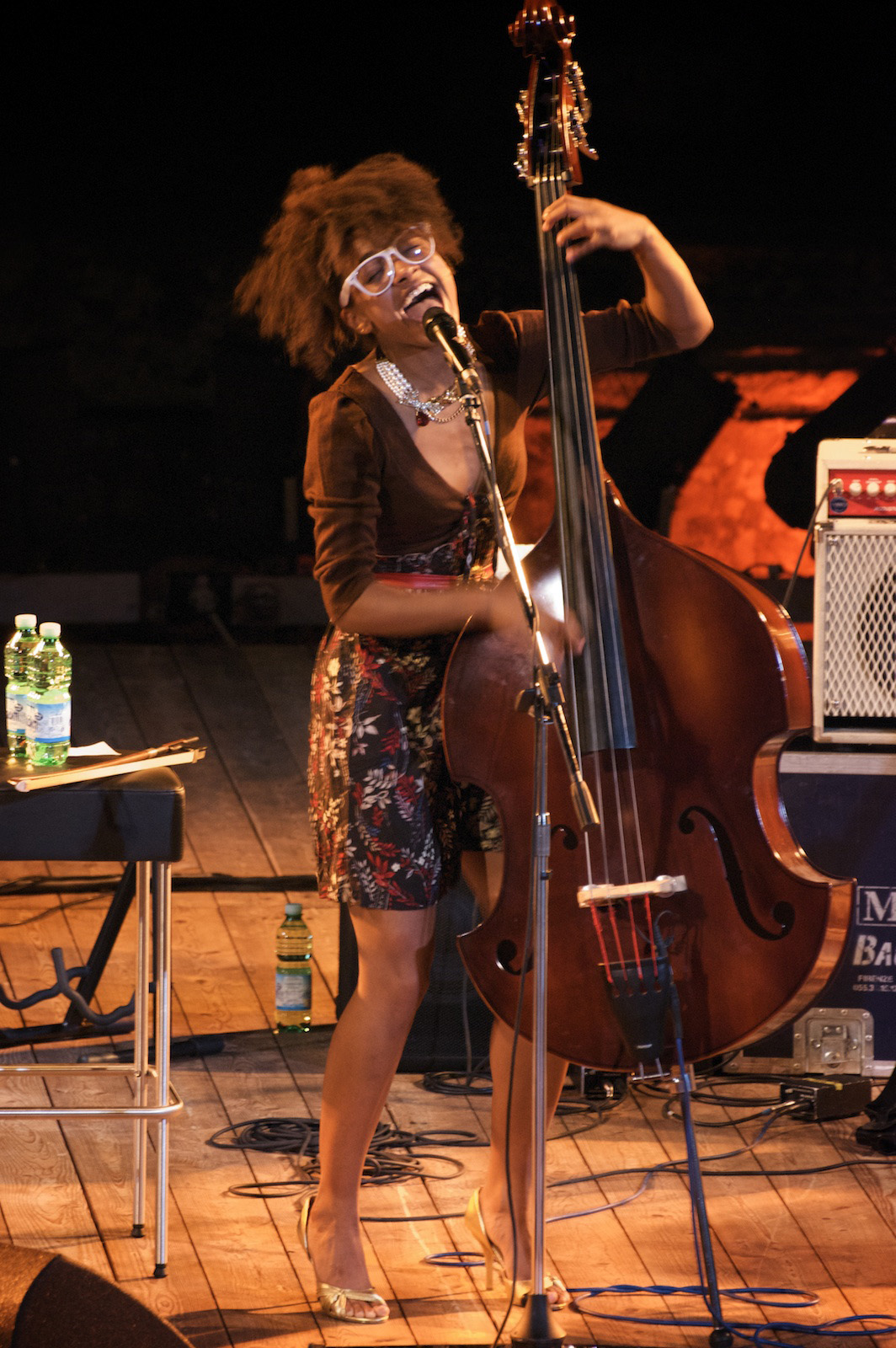|
Willie Cornish
William Cornish (August 1, 1875January 12, 1942) was an early jazz musicianknown for his being very active on the New Orleans scene playing, leading bands, and teaching music for decades. Career He was a member of Buddy Bolden's pioneering New Orleans style band, playing valve trombone, from about the late 1890s until 1903 or 1905, with a short break when he fought in the Spanish–American War The Spanish–American War (April 21 – August 13, 1898) was fought between Restoration (Spain), Spain and the United States in 1898. It began with the sinking of the USS Maine (1889), USS ''Maine'' in Havana Harbor in Cuba, and resulted in the .... He was also an early member of the Eureka Brass Band. When he had a stroke which paralysed his left side before the summer of 1931, he contrived a way of holding his trombone in place with a strap so that he could continue playing. References 1875 births 1942 deaths American jazz trombonists American male trombonists Jazz mus ... [...More Info...] [...Related Items...] OR: [Wikipedia] [Google] [Baidu] |
Jazz
Jazz is a music genre that originated in the African-American communities of New Orleans, Louisiana, in the late 19th and early 20th centuries. Its roots are in blues, ragtime, European harmony, African rhythmic rituals, spirituals, hymns, marches, vaudeville song, and dance music. Since the 1920s Jazz Age, it has been recognized as a major form of musical expression in traditional and popular music. Jazz is characterized by swing and blue notes, complex chords, call and response vocals, polyrhythms and improvisation. As jazz spread around the world, it drew on national, regional, and local musical cultures, which gave rise to different styles. New Orleans jazz began in the early 1910s, combining earlier brass band marches, French quadrilles, biguine, ragtime and blues with collective polyphonic improvisation. However, jazz did not begin as a single musical tradition in New Orleans or elsewhere. In the 1930s, arranged dance-oriented swing big bands, ... [...More Info...] [...Related Items...] OR: [Wikipedia] [Google] [Baidu] |
New Orleans
New Orleans (commonly known as NOLA or The Big Easy among other nicknames) is a Consolidated city-county, consolidated city-parish located along the Mississippi River in the U.S. state of Louisiana. With a population of 383,997 at the 2020 United States census, 2020 census, it is the List of municipalities in Louisiana, most populous city in Louisiana and the French Louisiana region, the second-most populous in the Deep South, and the twelfth-most populous in the Southeastern United States. The city is coextensive with Orleans Parish, Louisiana, Orleans Parish. New Orleans serves as a major port and a commercial hub for the broader Gulf Coast of the United States, Gulf Coast region. The New Orleans metropolitan area has a population of approximately 1 million, making it the most populous metropolitan area in Louisiana and the List of metropolitan statistical areas, 59th-most populous in the United States. New Orleans is world-renowned for Music of New Orleans, its distincti ... [...More Info...] [...Related Items...] OR: [Wikipedia] [Google] [Baidu] |
Buddy Bolden
Charles Joseph "Buddy" Bolden (September 6, 1877 – November 4, 1931) was an American cornetist who was regarded by contemporaries and later jazz scholars as a key figure in the development of a New Orleans style of ragtime music, or "jass", which later came to be known as jazz. Childhood When he was born, Bolden's father, Westmore Bolden, was working as a driver for William Walker, the former employer of Buddy's grandfather Gustavus Bolden, who was born in Louisiana in 1806 and died in 1866. Gustavus was most likely born into slavery, though no definitive records say. His mother, Alice (née Harris), was aged 18 when she married Westmore on August 14, 1873. Westmore Bolden was around 25 at the time, as records show that he was 19 in August 1866. When Buddy was six years old, his father died, after which the boy lived with his mother and other family members. In records of the period the family name is variously spelled ''Bolen'', ''Bolding'', ''Boldan'', and ''Bolden'', t ... [...More Info...] [...Related Items...] OR: [Wikipedia] [Google] [Baidu] |
Valve Trombone
The valve trombone is a brass instrument in the trombone family that has a set of valves to vary the pitch instead of (or in addition to) a slide. Although it has been built in sizes from alto to contrabass, it is the tenor valve trombone pitched in B♭ an octave lower than the trumpet which has seen the most widespread use. The most common models have three piston valves. They are found in jazz and popular music, as well as marching bands in Europe, where they are often built with rotary valves and were widely used in orchestras in the 19th century. History The valve trombone emerged concurrently with the invention of valves in the early 19th century. Most early instruments retained the shape and form of the slide trombone, employing three valves with the tubing arranged in place of the slide; others used the new valve mechanism as an opportunity to explore different configurations while retaining the overall cylindrical bore and bell profile. It enjoyed its greatest popu ... [...More Info...] [...Related Items...] OR: [Wikipedia] [Google] [Baidu] |
Spanish–American War
The Spanish–American War (April 21 – August 13, 1898) was fought between Restoration (Spain), Spain and the United States in 1898. It began with the sinking of the USS Maine (1889), USS ''Maine'' in Havana Harbor in Cuba, and resulted in the U.S. acquiring sovereignty over Puerto Rico, Guam, and the Philippines, and establishing a protectorate over Cuba. It represented U.S. intervention in the Cuban War of Independence and Philippine Revolution, with the latter later leading to the Philippine–American War. The Spanish–American War brought an end to almost four centuries of Spanish presence in the Americas, Asia, and the Pacific; the United States meanwhile not only became a major world power, but also gained several island possessions spanning the globe, which provoked rancorous debate over the wisdom of expansionism. The 19th century represented a clear decline for the Spanish Empire, while the United States went from a newly founded country to a rising power. In 1895, C ... [...More Info...] [...Related Items...] OR: [Wikipedia] [Google] [Baidu] |
Eureka Brass Band
The Eureka Brass Band was a brass band from New Orleans, active from 1920 to 1975, who recorded prolifically for Atlantic Records, Pax, Alamac, Folkways, Jazzology, and Sounds of New Orleans. The group's membership varied at any given time, usually comprising from nine to eleven members. The typical instrumentation was three trumpets, two trombones, two reeds, tuba, snare drum, and bass drum. The group was founded by trumpeter Willie Wilson, and its early members included clarinetists Willie Parker, John Casimir, George Lewis and cornetist Kid Rena. In the 1930s Wilson became ill, and trumpeter Alcide Landry retained nominal control over the band. After 1937, when Wilson's condition forced him to leave, sousaphonist Joseph "Red" Clark briefly became the group's leader, followed by Dominique "T-Boy" Remy (1937–46), and then Percy Humphrey, who led the group for the remainder of its existence. Line-ups A 1951 album ''New Orleans Parade'' features Humphrey, trombonists ... [...More Info...] [...Related Items...] OR: [Wikipedia] [Google] [Baidu] |
1875 Births
Events January * January 1 – The Midland Railway of England abolishes the Second Class passenger category, leaving First Class and Third Class. Other British railway companies follow Midland's lead during the rest of the year (Third Class is renamed Second Class in 1956). * January 5 – The Palais Garnier, one of the most famous opera houses in the world, is inaugurated as the home of the Paris Opera. * January 12 – Guangxu Emperor, Guangxu becomes the 11th Qing dynasty Emperor of China at the age of 3. He succeeds his cousin, the Tongzhi Emperor, who had no sons of his own. * January 14 – The newly proclaimed King Alfonso XII of Spain (Queen Isabella II's son) arrives in Spain to restore the monarchy during the Third Carlist War. * January 24 – Camille Saint-Saëns' orchestral ''Danse macabre (Saint-Saëns), Danse macabre'' receives its première. February * February 3 – Third Carlist War: Battle of Lácar – Carlist commander Torcuat ... [...More Info...] [...Related Items...] OR: [Wikipedia] [Google] [Baidu] |
1942 Deaths
The Uppsala Conflict Data Program project estimates this to be the deadliest year in human history in terms of conflict deaths, placing the death toll at 4.62 million. However, the Correlates of War estimates that the prior year, 1941, was the deadliest such year. Death toll estimates for both 1941 and 1942 range from 2.28 to 7.71 million each. Events Below, the events of World War II have the "WWII" prefix. January * January 1 – WWII: The Declaration by United Nations is signed by China, the United Kingdom, the United States, the Soviet Union, and 22 other nations, in which they agree "not to make any separate peace with the Axis powers". * January 5 – WWII: Two prisoners, British officer Airey Neave and Dutch officer Anthony Luteyn, escape from Colditz Castle in Germany. After travelling for three days, they reach the Swiss border. * January 7 – WWII: ** Battle of Slim River: Japanese forces of the 5th Division, supported by tanks, sweep through ... [...More Info...] [...Related Items...] OR: [Wikipedia] [Google] [Baidu] |
American Jazz Trombonists
American(s) may refer to: * American, something of, from, or related to the United States of America, commonly known as the "United States" or "America" ** Americans, citizens and nationals of the United States of America ** American ancestry, people who self-identify their ancestry as "American" ** American English, the set of varieties of the English language native to the United States ** Native Americans in the United States, indigenous peoples of the United States * American, something of, from, or related to the Americas, also known as "America" ** Indigenous peoples of the Americas * American (word), for analysis and history of the meanings in various contexts Organizations * American Airlines, U.S.-based airline headquartered in Fort Worth, Texas * American Athletic Conference, an American college athletic conference * American Recordings (record label), a record label that was previously known as Def American * American University, in Washington, D.C. Sports teams S ... [...More Info...] [...Related Items...] OR: [Wikipedia] [Google] [Baidu] |
Jazz Musicians From New Orleans
Jazz is a music genre that originated in the African-American communities of New Orleans, Louisiana, in the late 19th and early 20th centuries. Its roots are in blues, ragtime, European harmony, African rhythmic rituals, spirituals, hymns, marches, vaudeville song, and dance music. Since the 1920s Jazz Age, it has been recognized as a major form of musical expression in traditional and popular music. Jazz is characterized by swing and blue notes, complex chords, call and response vocals, polyrhythms and improvisation. As jazz spread around the world, it drew on national, regional, and local musical cultures, which gave rise to different styles. New Orleans jazz began in the early 1910s, combining earlier brass band marches, French quadrilles, biguine, ragtime and blues with collective polyphonic improvisation. However, jazz did not begin as a single musical tradition in New Orleans or elsewhere. In the 1930s, arranged dance-oriented swing big bands, Kansa ... [...More Info...] [...Related Items...] OR: [Wikipedia] [Google] [Baidu] |







